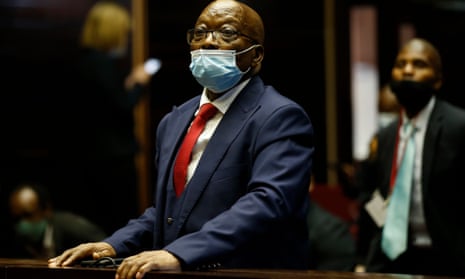Jacob Zuma, the former president of South Africa, accused prosecutors of seeking to malign a political leader rather than find the truth as he denied charges of corruption at the first major hearing of his trial.
Zuma, 79, faces charges of bribery, fraud, racketeering and money laundering relating to a $2.5bn (£2bn) deal to buy European military hardware to upgrade South Africa’s armed forces in 1999 when he was deputy president.
The veteran politician, who was ousted in 2018 after nine years in office, entered a plea of not guilty after prosecutors read out the charges against him.
Zuma told the court the prosecution was politically motivated, accusing government lawyers of working “not to find the truth but to bolster a narrative of a corrupt political leader”.
Hundreds of supporters had gathered in front of a large stage decked in African National Congress (ANC) party colours set up outside the courthouse in the south-eastern city of Pietermaritzburg.
The case has become a battleground for factions within the ruling ANC, which remains deeply divided. Successive corruption scandals have badly hurt the reputation of the party, which has ruled South Africa since the end of apartheid in 1994.
Zuma, who also faces a separate inquiry into corruption during his time as president, is accused of accepting 500,000 rand (£26,000) annually from the French arms company Thales, in exchange for protecting the company from an investigation into the deal.
Thales has also denied any wrongdoing.
Lawyers for the former president are applying for the lead state prosecutor to stand down on technical legal grounds.
Public outrage in South Africa at widespread corruption among government officials has been building for years but was fuelled over the past year by a series of new allegations of huge sums corruptly earned on contracts for emergency supplies to combat the Covid-19 pandemic, and grants to support the most needy.
South Africa has been hit badly by the pandemic, with excess mortality figures suggesting almost three times as many people have died from the disease than the official total of 55,000. The country is now entering a third wave of infections as a vaccine programme struggles to gather pace.
Zuma’s successor as president, Cyril Ramaphosa, a labour activist turned wealthy tycoon, has taken steps to stamp out graft but has only recently begun to score high-profile victories.
Ace Magashule, the party’s secretary general and an ally of Zuma, was suspended this month after refusing to step down. He is facing trial for allegedly playing a key role in a $15m contract to find and remove asbestos from homes in disadvantaged neighbourhoods in Free State province.
Magashule and several other senior ANC figures accused of corruption travelled to the court to support the former president at his last hearing.
Earlier this week Jesse Duarte, a senior ANC official, filed legal documents in which she said the party wanted people in positions of power to be “beyond doubt or reproach”.
In a public hearing last year as part of a judicial commission of inquiry set up as he left power, Zuma denied he had presided over an immense system of corruption and patronage that drained billions from the country’s exchequer. He told the inquiry he was a victim of a plot by foreign intelligence agencies seeking his downfall. He then walked out of the hearings and faces a possible jail sentence after failing to reappear.
Analysts said Zuma’s refusal to appear before the inquiry was one of the most significant tests of South Africa’s democratic institutions for many years.
The next hearing will be on 19 July.
